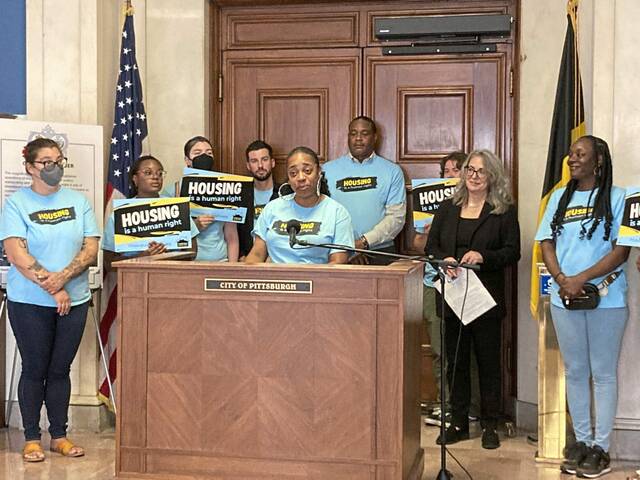https://naviga.triblive.com/local/pittsburgh-seeks-to-allot-up-to-2m-per-year-to-aid-tenants-fighting-eviction/
Pittsburgh seeks to allot up to $2M per year to aid tenants fighting eviction

Jala Rucker was nearly evicted nine years ago from her home on Pittsburgh’s North Side.
Rucker didn’t know where she would take her kids if she got kicked out of her Manchester apartment — and she didn’t know what would happen to the dozens of neighbors in her building who were faced with a similar conundrum.
“No one cared where we were going, if we were going to be safe,” she said.
Rucker was able to get help from local officials and form a tenant council. Ultimately, the city’s housing authority purchased the building, and she still lives there now, nearly a decade later.
But Rucker keeps that firsthand experience in mind as she works with the Pittsburgh Housing Justice Table to support others who are facing eviction.
At a press conference Tuesday, Rucker said a proposal now before Pittsburgh City Council that would annually dedicate a portion of the city’s Stop the Violence trust fund to providing legal support for renters facing eviction would be a major step to supporting others who face similar plights.
The legislation — which is spearheaded by Councilwoman Deb Gross, D-Highland Park, and co-sponsored by six other council members — would allow council to dedicate up to 20% of the Stop the Violence fund to legal assistance for people about to be kicked out of their homes each year.
The Stop the Violence fund can hold up to $10 million a year, meaning city officials could allocate up to $2 million each year for the effort.
Gross said she’s hoping to get matching funds from other levels of government or private partners.
A pilot program launched in October 2022 provided legal help for renters facing eviction in four of the city’s 12 magisterial district courts.
That program already has served more than 1,600 households, said Swain Uber, an attorney with the Community Justice Project and coordinator of the pilot program.
The legal assistance helped prevent eviction in nearly 75% of instances, a fivefold improvement from before the program was implemented, Uber said.
“Those are kids that don’t have to sleep on someone’s couch, that don’t have to move out of the city, that don’t have to switch schools three times in a year,” Gross said.
If the legislation introduced Tuesday is passed, Gross said, the program will expand citywide.
Eviction is a leading cause of homelessness and school absenteeism, said Crystal Jennings-Rivera, director of stewardship and community engagement with City of Bridges Community Land Trust.
Everyone, she said, “deserves a secure home to raise their families and pursue their dreams.”
“Our neighbors deserve access to legal support needed to stay in their homes,” she said.
Nationwide, Jennings-Rivera said, only about 3% of tenants in eviction cases have lawyers to help them through the legal proceedings. More than 80% of landlords have lawyers.
Tenants who were enrolled in a similar program in San Francisco were about 90% more likely to stay in their homes if they had legal assistance.
Officials on Tuesday voiced support for pulling money from the Stop the Violence fund, which is dedicated to violence prevention efforts. Council President R. Daniel Lavelle, D-Hill District, said curbing evictions helps address a root cause of violence and crime.
“When we created the Stop the Violence fund four years ago, we did so with the idea to be proactive, that government should be investing in things, investing in organizations, investing in programs… so that on the front end, you’re preventing the negative things from happening,” Lavelle said.
Mayor Ed Gainey also has voiced his support for funding legal assistance to help people fight eviction.
“This changes the culture of the city,” Gainey said. “This puts our most vulnerable population first.”
Councilman Anthony Coghill, D-Beechview, said this issue is personal for him. He recalled watching his single mother “scrambling to get that rent together” every month so he and his two older brothers wouldn’t be kicked to the streets.
“It pulls on my heartstrings because poverty does not discriminate,” he said.
Copyright ©2026— Trib Total Media, LLC (TribLIVE.com)
